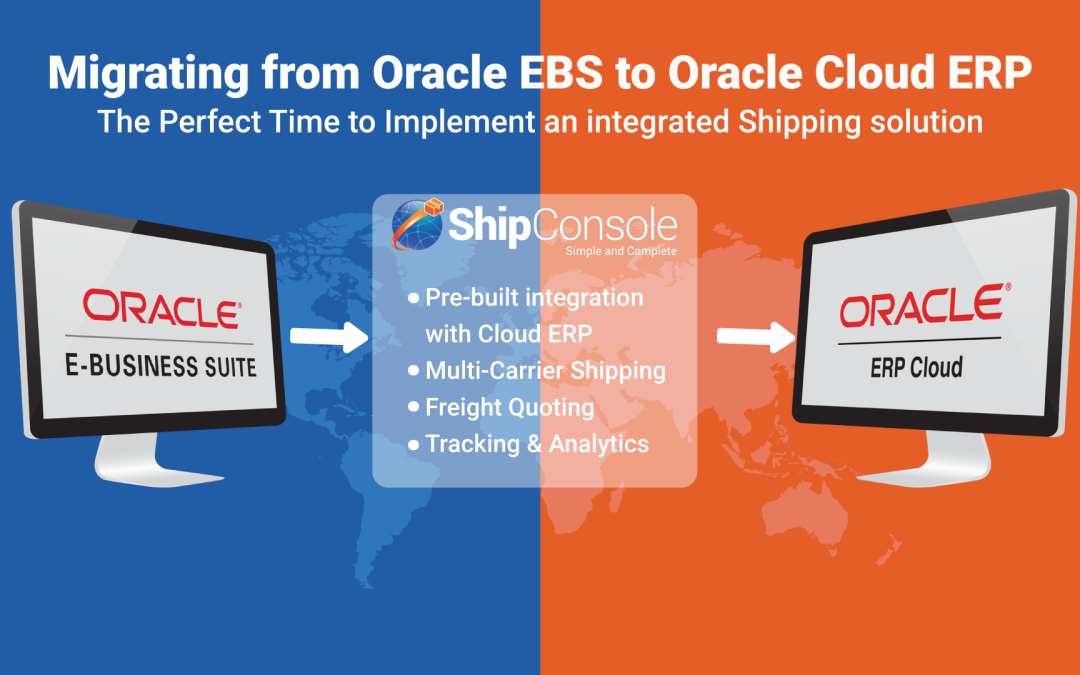In the dynamic landscape of enterprise resource planning (ERP), businesses are constantly seeking ways to enhance efficiency, streamline processes, and stay ahead of the competition. For those currently leveraging Oracle E-Business Suite (EBS), the journey to Oracle Cloud ERP or Fusion Applications has become an enticing proposition. In this blog post, we will delve into the intricacies of migrating from Oracle EBS to Oracle Cloud ERP and shed light on this opportune moment to implement an Oracle-integrated shipping solution like ShipConsole.
Migration from Oracle EBS to Oracle Cloud ERP: Time and Effort:
Moving from Oracle EBS to Oracle Cloud ERP involves a strategic approach to ensure a seamless transition. The process encompasses data migration, customization adjustments, and system integrations. The time and effort required vary based on the complexity of the existing Oracle EBS implementation, data volume, and specific customization requirements. Engaging with an experienced Oracle implementation expert is crucial to navigate this migration journey efficiently.
The Ideal Time to Implement Shipping Software:
Amidst the migration to Oracle Cloud ERP, organizations should seize the opportunity to implement an Oracle-integrated shipping solution. The implementation of shipping software, such as ShipConsole, is very effective when carried out during the ERP transition. This strategic move allows businesses to align shipping processes seamlessly with the new ERP, avoiding potential disruptions and maximizing operational efficiency.
Benefits of Oracle Integrated Shipping Software for Multi-Carrier Shipping:
ShipConsole offers a comprehensive solution for multi-carrier shipping, providing businesses with the flexibility to choose the most cost-effective carrier/service during the quoting process within the ERP system. Core benefits include real-time rate shopping, address validation, automated label/document generation, shipment tracking, and reporting/analytics. This integration streamlines shipping operations, reduces manual errors, and enhances overall supply chain visibility.
Advantages of Prebuilt Software vs. Carrier-Provided and Custom-Built Solutions:
Pre-integrated Software:
ShipConsole is pre-integrated with Oracle Cloud ERP, ensuring quick implementation with zero development. ShipConsole’s prebuilt solution offers a user-friendly interface, reducing the learning curve for employees and promoting widespread adoption.
Carrier-Provided Software:
While carriers often offer their shipping solutions, these may lack the depth of integration and customization options available in prebuilt solutions. In this case, users need to navigate through each carrier’s software to process respective carrier shipments, leading to a fragmented and time-consuming process. The integration with Oracle Cloud ERP can be complex and expensive and may not provide the level of automation businesses need.
Custom-Built Solutions:
Custom-built shipping solutions may offer high levels of customization, but they are often time-consuming and expensive to develop and maintain. Moreover, they may lack the agility required to adapt to evolving shipping and ERP landscapes.
Conclusion:
In conclusion, the migration from Oracle EBS to Oracle Cloud ERP presents an opportune moment for businesses to enhance their shipping operations with an Oracle-integrated solution like ShipConsole. Leveraging pre-integrated software ensures a smoother transition, while the benefits of multi-carrier shipping integration contribute to increased efficiency, cost savings, and improved customer satisfaction. Engaging with an integrated shipping software provider like ShipConsole during this transition can make the journey not only successful but transformative for the entire organization. Seize the moment and ride the waves of change toward a more efficient and integrated future.

Pavan Telluru works as a Product Manager at ShipConsole. He brings over a decade of experience to his current role where he’s dedicated to conducting product demos to prospects and partners about how to organizations can efficiently manage their shipping execution process. He also leads marketing efforts at ShipConsole.


